化工专业英语科技论文
- 格式:ppt
- 大小:184.00 KB
- 文档页数:24
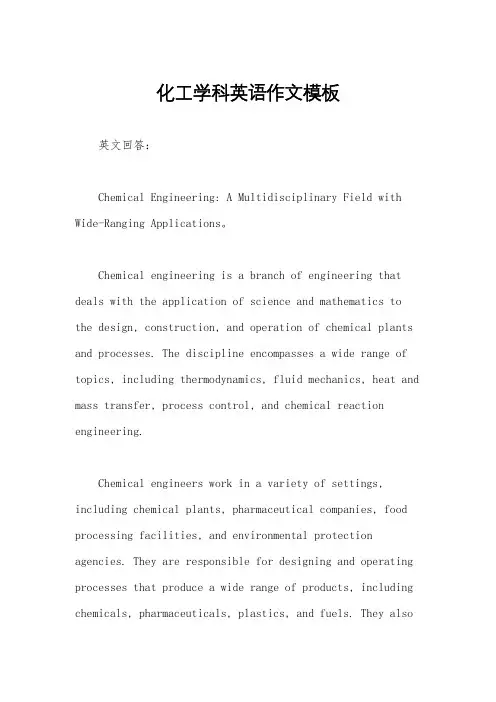
化工学科英语作文模板英文回答:Chemical Engineering: A Multidisciplinary Field with Wide-Ranging Applications。
Chemical engineering is a branch of engineering that deals with the application of science and mathematics to the design, construction, and operation of chemical plants and processes. The discipline encompasses a wide range of topics, including thermodynamics, fluid mechanics, heat and mass transfer, process control, and chemical reaction engineering.Chemical engineers work in a variety of settings, including chemical plants, pharmaceutical companies, food processing facilities, and environmental protection agencies. They are responsible for designing and operating processes that produce a wide range of products, including chemicals, pharmaceuticals, plastics, and fuels. They alsowork to develop and improve processes that are more efficient, less polluting, and safer.Chemical engineering is a rapidly growing field, as the demand for chemicals and other products continues to increase. In addition, the need for sustainable and environmentally friendly processes is driving the development of new technologies and processes in the field.Key Features of Chemical Engineering。
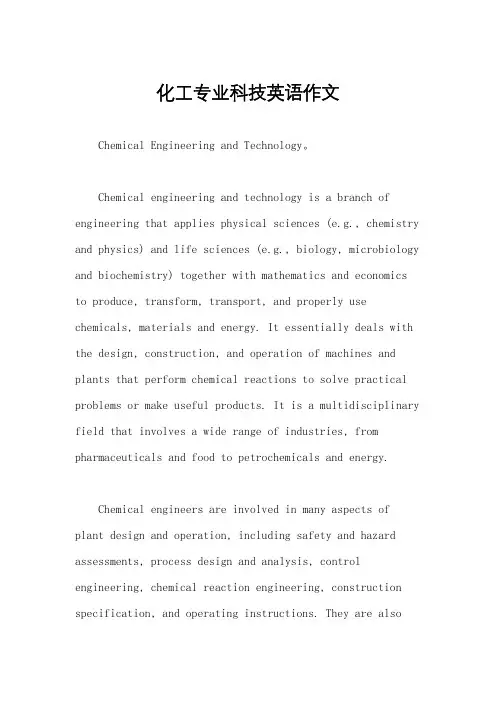
化工专业科技英语作文Chemical Engineering and Technology。
Chemical engineering and technology is a branch of engineering that applies physical sciences (e.g., chemistry and physics) and life sciences (e.g., biology, microbiology and biochemistry) together with mathematics and economics to produce, transform, transport, and properly use chemicals, materials and energy. It essentially deals with the design, construction, and operation of machines and plants that perform chemical reactions to solve practical problems or make useful products. It is a multidisciplinary field that involves a wide range of industries, from pharmaceuticals and food to petrochemicals and energy.Chemical engineers are involved in many aspects ofplant design and operation, including safety and hazard assessments, process design and analysis, control engineering, chemical reaction engineering, construction specification, and operating instructions. They are alsoresponsible for the development of new materials and technologies, such as nanotechnology, fuel cells and biomedical engineering. In addition, they play a key rolein environmental protection and the development of sustainable processes and products.Chemical engineering and technology is a rapidly growing field with great potential for future development. As the demand for energy and materials continues to increase, the need for chemical engineers will also grow. In addition, the increasing focus on environmental sustainability and the development of new technologies will create new opportunities for chemical engineers to make a significant impact on society.One of the key challenges facing chemical engineers today is the need to develop sustainable processes and products. With the increasing awareness of environmental issues and the finite nature of natural resources, there is a growing demand for processes and products that minimize waste, reduce energy consumption, and use renewable resources. Chemical engineers are at the forefront of thiseffort, developing new technologies and processes that are more sustainable and environmentally friendly.Another challenge facing chemical engineers is the need to develop new materials and technologies to meet the demands of a rapidly changing world. As new industries and technologies emerge, there is a growing need for new materials and processes that can meet the demands of these industries. Chemical engineers are working to develop new materials and technologies that can meet the needs of these industries, such as advanced materials for electronics, new materials for energy storage, and new processes for the production of biofuels.In conclusion, chemical engineering and technology is a dynamic and rapidly growing field with great potential for future development. Chemical engineers play a key role in the development of new materials and technologies, the design and operation of chemical processes, and the development of sustainable processes and products. With the increasing demand for energy and materials, and the growingfocus on environmental sustainability, the need for chemical engineers will continue to grow in the future.。
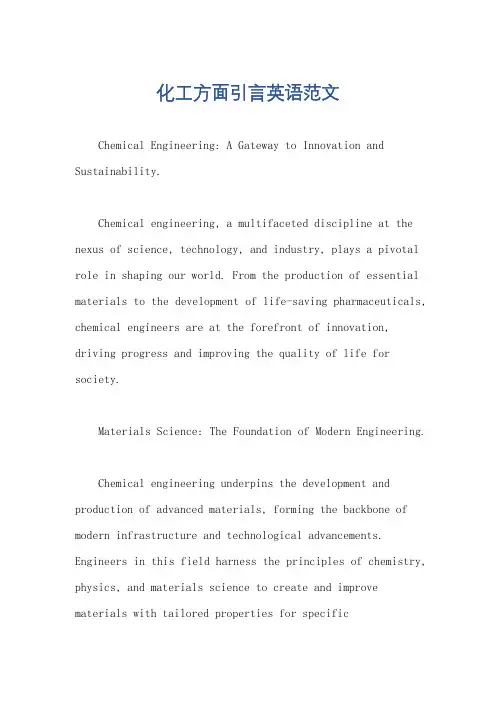
化工方面引言英语范文Chemical Engineering: A Gateway to Innovation and Sustainability.Chemical engineering, a multifaceted discipline at the nexus of science, technology, and industry, plays a pivotal role in shaping our world. From the production of essential materials to the development of life-saving pharmaceuticals, chemical engineers are at the forefront of innovation, driving progress and improving the quality of life for society.Materials Science: The Foundation of Modern Engineering.Chemical engineering underpins the development and production of advanced materials, forming the backbone of modern infrastructure and technological advancements. Engineers in this field harness the principles of chemistry, physics, and materials science to create and improve materials with tailored properties for specificapplications. From lightweight composites for aerospace engineering to biocompatible implants for medical devices, chemical engineers are pushing the boundaries of material science to meet the demands of the future.Energy Conversion and Storage: Addressing Global Challenges.With the growing global energy demand and the urgent need for sustainable solutions, chemical engineers are atthe forefront of developing efficient and environmentally friendly energy systems. They design and optimize processes for the conversion, transportation, and storage of energy, exploring renewable sources such as solar, wind, and biomass. By harnessing their expertise in thermodynamics, fluid mechanics, and electrochemistry, chemical engineers are contributing to the transition towards a cleaner and more sustainable energy future.Pharmaceuticals and Biotechnology: Improving Healthcare.Chemical engineers play a crucial role in thepharmaceutical and biotechnology industries, where they design and optimize processes for the production of life-saving drugs and therapies. Utilizing their knowledge of reaction kinetics, bioprocessing, and separation technologies, they develop efficient methods for manufacturing biologics, vaccines, and other essential healthcare products. Chemical engineers are also at the forefront of drug delivery research, devising innovative strategies for targeted and personalized treatments.Process Engineering: Optimizing Industrial Efficiency.Chemical engineers are responsible for designing, operating, and optimizing industrial processes, ensuring efficient and sustainable production of chemicals, fuels, and other essential products. They apply principles of mass and energy transfer, thermodynamics, and reaction engineering to develop and improve processes, minimizing waste, reducing energy consumption, and meeting environmental regulations. Process engineering is a key aspect of chemical engineering, enabling industries to operate efficiently while meeting the demands of a growingpopulation.Sustainability and Environmental Protection.Chemical engineers are acutely aware of the environmental impact of industrial activities and are committed to developing sustainable solutions. They design and implement processes that minimize pollution, reduce greenhouse gas emissions, and conserve natural resources. Chemical engineers are also involved in the development of renewable energy technologies, waste management systems, and other initiatives aimed at protecting the environment and ensuring a sustainable future.Education and Training: Preparing the Next Generation.The field of chemical engineering is constantly evolving, with the emergence of new technologies and the need to address global challenges. Chemical engineering education provides students with a strong foundation in the fundamental principles of chemistry, mathematics, physics, and engineering, equipping them with the knowledge andskills necessary to succeed in this dynamic field. Universities and institutions around the world offer undergraduate, graduate, and research programs in chemical engineering, preparing the next generation of engineers to drive innovation and shape the future of our world.Conclusion.Chemical engineering is an essential discipline that touches every aspect of modern life. Chemical engineers are innovators, problem-solvers, and guardians of the environment, harnessing their knowledge and skills to create solutions that improve the quality of life for society. As the world faces new challenges and opportunities, chemical engineers will undoubtedly continue to play a pivotal role in shaping our future.。
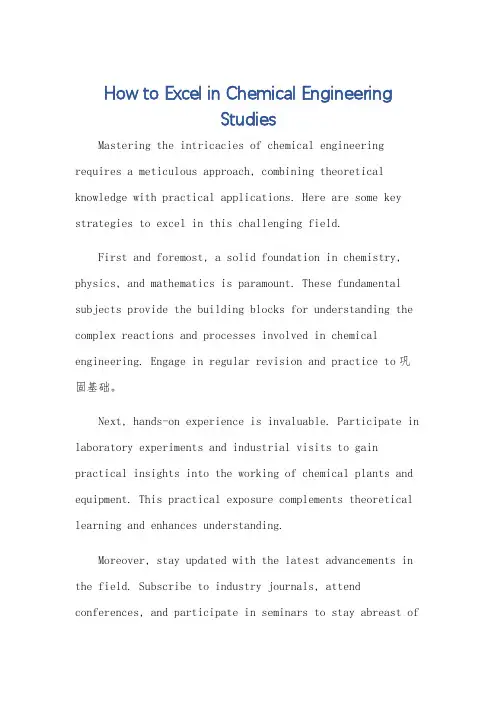
How to Excel in Chemical EngineeringStudiesMastering the intricacies of chemical engineering requires a meticulous approach, combining theoretical knowledge with practical applications. Here are some key strategies to excel in this challenging field.First and foremost, a solid foundation in chemistry, physics, and mathematics is paramount. These fundamental subjects provide the building blocks for understanding the complex reactions and processes involved in chemical engineering. Engage in regular revision and practice to巩固基础。
Next, hands-on experience is invaluable. Participate in laboratory experiments and industrial visits to gain practical insights into the working of chemical plants and equipment. This practical exposure complements theoretical learning and enhances understanding.Moreover, stay updated with the latest advancements in the field. Subscribe to industry journals, attend conferences, and participate in seminars to stay abreast ofnew technologies and techniques. Staying informed helps in adapting to changing industry requirements.Additionally, developing problem-solving skills is crucial. Chemical engineering involves addressing a wide range of challenges, from process optimization to safety issues. Practice solving problems independently and in groups to enhance analytical and critical thinking.Lastly, collaboration and communication skills are essential. Chemical engineers often work in teams and need to effectively communicate ideas, findings, and recommendations. Cultivating good communication skills and learning to work collaboratively can significantly boost one's performance.In conclusion, excelling in chemical engineering requires a combination of theoretical knowledge, practical experience, continuous learning, problem-solving skills, and collaboration. By following these strategies, students can succeed in this challenging and rewarding field.**如何学好化工专业**学好化工专业需要一套系统的方法,它要求我们将理论知识与实践应用相结合。
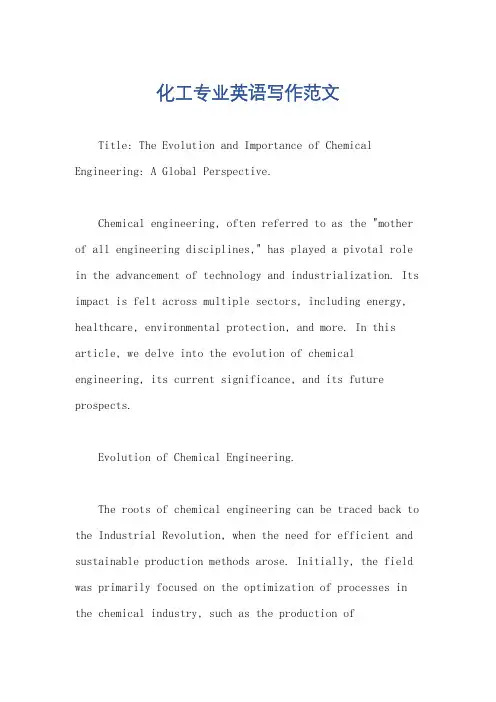
化工专业英语写作范文Title: The Evolution and Importance of Chemical Engineering: A Global Perspective.Chemical engineering, often referred to as the "mother of all engineering disciplines," has played a pivotal role in the advancement of technology and industrialization. Its impact is felt across multiple sectors, including energy, healthcare, environmental protection, and more. In this article, we delve into the evolution of chemical engineering, its current significance, and its future prospects.Evolution of Chemical Engineering.The roots of chemical engineering can be traced back to the Industrial Revolution, when the need for efficient and sustainable production methods arose. Initially, the field was primarily focused on the optimization of processes in the chemical industry, such as the production offertilizers and dyes. However, as technology advanced, the scope of chemical engineering broadened to include areas like biochemistry, environmental engineering, and nanotechnology.One of the most significant milestones in the evolution of chemical engineering was the development of the principles of reaction engineering in the early 20th century. This marked a shift from a reliance on empirical methods to a more rigorous and systematic approach, based on the principles of physics and chemistry. This development laid the foundation for the design and optimization of chemical reactors, which are crucial in the production of various chemicals.Another key development was the integration of computers into chemical engineering in the later part of the 20th century. This integration enabled engineers to model and simulate complex chemical processes, thus predicting their behavior more accurately. Computer-aided design (CAD) and computer-aided manufacturing (CAM) tools also revolutionized the design and fabrication of chemicalplants, making the process more efficient and cost-effective.Current Significance of Chemical Engineering.Today, chemical engineering is at the forefront of addressing many of the world's most pressing challenges. For instance, it plays a crucial role in the development of sustainable energy solutions. Chemical engineers are involved in the research and development of efficient solar cells, batteries, and fuel cells, as well as in the optimization of biofuel production processes.In healthcare, chemical engineering has madesignificant contributions to the development of drugs and therapies. By manipulating molecules at the nanoscale, engineers are able to create targeted drugs that are more effective and have fewer side effects. They are also involved in the design of medical devices and the optimization of bioprocessing techniques for tissue engineering and regenerative medicine.Moreover, chemical engineering is essential in addressing environmental challenges. Engineers are working to develop more efficient waste treatment and recycling methods, as well as to mitigate the impact of industrial processes on the environment. They are also involved in the research and development of sustainable materials that can replace traditional, environmentally harmful ones.Future Prospects of Chemical Engineering.The future of chemical engineering looks bright, with numerous opportunities for innovation and growth. One area that is expected to witness significant advancements is biotechnology. With the advent of synthetic biology and genome editing tools like CRISPR-Cas9, chemical engineers will be able to design and engineer cells and organisms with enhanced functionalities. This could lead to the development of novel bioproducts, such as bioplastics and biofuels, that are more sustainable and environmentally friendly.Another area of potential growth is nanotechnology.Chemical engineers are exploring the use of nanomaterialsin various applications, including drug delivery, energy storage, and environmental remediation. The uniqueproperties of nanomaterials, such as their large surface area and enhanced reactivity, make them ideal foraddressing many of the challenges faced by the chemical industry.Lastly, the integration of digital technologies, suchas artificial intelligence (AI) and the Internet of Things (IoT), is expected to transform chemical engineering. These technologies can be used to optimize processes in real-time, predict and prevent failures, and improve safety and sustainability. By leveraging the power of data analytics and predictive modeling, chemical engineers will be able to make more informed decisions and develop more efficient and cost-effective processes.In conclusion, chemical engineering has come a long way since its inception and continues to play a pivotal role in addressing the world's most pressing challenges. As we look to the future, it is exciting to imagine the innovativesolutions that chemical engineers will develop and the impact they will have on society.。
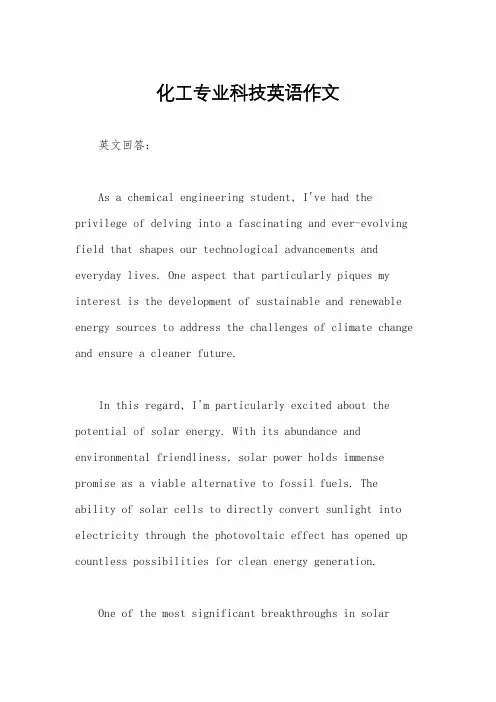
化工专业科技英语作文英文回答:As a chemical engineering student, I've had the privilege of delving into a fascinating and ever-evolving field that shapes our technological advancements and everyday lives. One aspect that particularly piques my interest is the development of sustainable and renewable energy sources to address the challenges of climate change and ensure a cleaner future.In this regard, I'm particularly excited about the potential of solar energy. With its abundance and environmental friendliness, solar power holds immense promise as a viable alternative to fossil fuels. Theability of solar cells to directly convert sunlight into electricity through the photovoltaic effect has opened up countless possibilities for clean energy generation.One of the most significant breakthroughs in solartechnology has been the development of perovskite solar cells. Perovskites, a class of crystalline materials, exhibit exceptional light-absorbing properties and have demonstrated remarkable efficiencies in converting solar energy into electricity. This discovery has revolutionized the field, offering the potential for cheaper and more efficient solar panels.Another promising area of research is the exploration of artificial photosynthesis. This innovative approach aims to mimic the natural process of photosynthesis, where plants convert sunlight and water into glucose. By designing artificial systems that can perform similar reactions, we can potentially harness the power of sunlight to produce clean and renewable fuels, such as hydrogen and methanol.Furthermore, the development of nanotechnology is playing a pivotal role in advancing solar energy technologies. Nanoparticles and nanostructures can enhance the efficiency of solar cells by manipulating light absorption and charge transport properties. By tailoringthe size, shape, and composition of these nanomaterials, scientists can optimize the performance of solar devices.The integration of solar energy into our energy grids presents challenges and opportunities alike. Smart grid technologies, combined with energy storage systems, will be essential in managing the intermittent nature of solar power and ensuring a reliable and resilient energy supply. Additionally, the development of smart homes and buildings that incorporate solar energy generation and storage will empower consumers to take a more active role in their energy consumption and contribute to a more sustainable future.In conclusion, the pursuit of sustainable and renewable energy sources through chemical engineering is acaptivating endeavor that holds the key to addressing the urgent challenges of climate change while ensuring a brighter future for our planet. As a student in this field, I'm eager to contribute to these advancements and make a meaningful impact on the world.中文回答:身为一名化工专业的学生,我很荣幸能够深入钻研这个迷人且不断发展的领域,它塑造了我们的技术进步和日常生活。
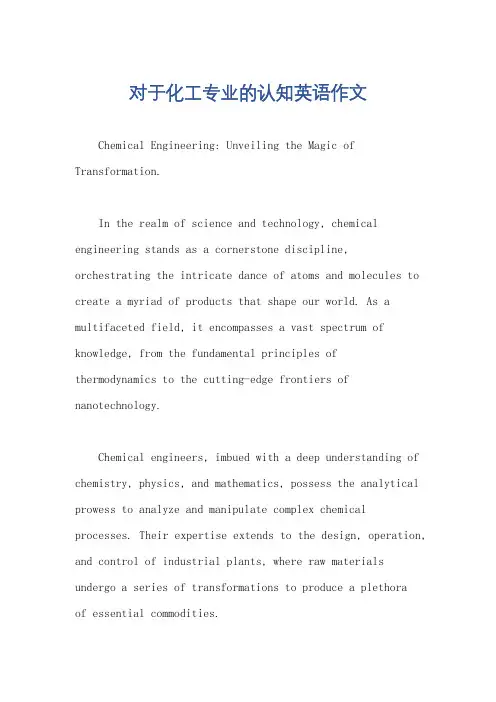
对于化工专业的认知英语作文Chemical Engineering: Unveiling the Magic of Transformation.In the realm of science and technology, chemical engineering stands as a cornerstone discipline,orchestrating the intricate dance of atoms and molecules to create a myriad of products that shape our world. As a multifaceted field, it encompasses a vast spectrum of knowledge, from the fundamental principles of thermodynamics to the cutting-edge frontiers of nanotechnology.Chemical engineers, imbued with a deep understanding of chemistry, physics, and mathematics, possess the analytical prowess to analyze and manipulate complex chemical processes. Their expertise extends to the design, operation, and control of industrial plants, where raw materials undergo a series of transformations to produce a plethoraof essential commodities.The chemical engineering profession plays a pivotalrole in meeting the ever-increasing demands of a growing population. From developing sustainable energy sources to devising innovative pharmaceuticals, chemical engineers are at the forefront of addressing global challenges and improving the quality of life.Unveiling the Core Principles: A Foundation of Scientific Understanding.At the heart of chemical engineering lies a profound understanding of the fundamental principles governing the behavior of matter. Thermodynamics provides a framework for analyzing energy transfer, while fluid mechanics elucidates the dynamics of fluids in motion. Transport phenomena, encompassing heat transfer, mass transfer, and momentum transfer, provides a vital foundation for understanding the mechanisms underlying chemical processes.Unit operations, the building blocks of chemical engineering, represent specific processes utilized toseparate, purify, or transform chemical substances. These operations, ranging from distillation and filtration to crystallization and drying, are combined and optimized to achieve the desired product specifications.Industrial Alchemy: From Raw Materials to Value-Added Products.Chemical engineers are the orchestrators of industrial-scale chemical transformations, translating scientific principles into tangible products. They design and operate chemical plants, where raw materials such as petroleum, natural gas, and minerals are meticulously processed to produce a vast array of essential commodities.The chemical industry is a cornerstone of modern society, providing the foundation for countless products that touch every aspect of our lives. From plastics and fertilizers to pharmaceuticals and electronics, chemical engineers play an indispensable role in shaping the material fabric of our world.Advancing Frontiers: Pushing the Boundaries of Innovation.Beyond the traditional realms of chemical engineering, the field is constantly evolving, embracing new technologies and pioneering new frontiers. Nanotechnology, for instance, holds the promise of revolutionizing everything from drug delivery to energy storage.Chemical engineers are also at the forefront of developing sustainable solutions to the global challenges facing humanity. They are working to reduce carbon emissions, develop renewable energy sources, and design more efficient and environmentally friendly industrial processes.A Lucrative and Rewarding Career Path: The Rewards of a Chemical Engineering Degree.The field of chemical engineering offers a rewarding and lucrative career path for those with a passion for science and innovation. Chemical engineers are in highdemand across a wide range of industries, including pharmaceuticals, petrochemicals, food processing, and energy.A chemical engineering degree provides a strong foundation for a variety of technical and management roles, including research and development, process design, plant operations, and project management. The median annual salary for chemical engineers is significantly higher than the average salary for all occupations.Conclusion: A Vital Discipline for the Future.Chemical engineering is a dynamic and ever-evolving field that plays a pivotal role in shaping the world around us. Its practitioners are the architects of industrial transformations, unlocking the potential of matter to create a myriad of products essential to modern society.As the world faces unprecedented challenges, chemical engineers will continue to be at the forefront of innovation, developing sustainable solutions and pushingthe boundaries of scientific knowledge. Their expertise will be crucial in addressing global issues, improving the quality of life, and ensuring a brighter future for generations to come.。
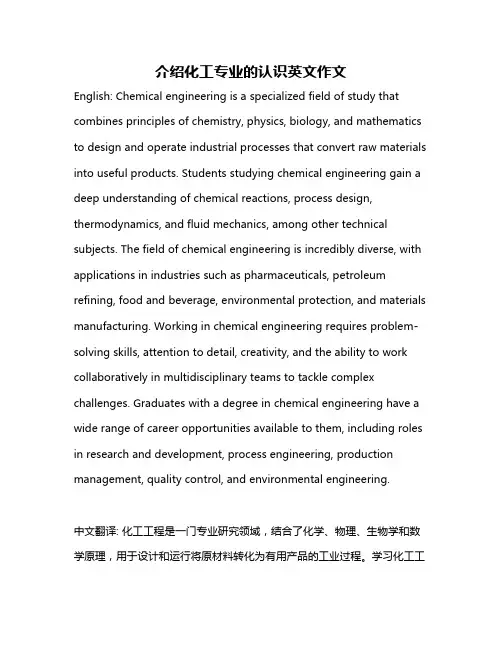
介绍化工专业的认识英文作文English: Chemical engineering is a specialized field of study that combines principles of chemistry, physics, biology, and mathematics to design and operate industrial processes that convert raw materials into useful products. Students studying chemical engineering gain a deep understanding of chemical reactions, process design, thermodynamics, and fluid mechanics, among other technical subjects. The field of chemical engineering is incredibly diverse, with applications in industries such as pharmaceuticals, petroleum refining, food and beverage, environmental protection, and materials manufacturing. Working in chemical engineering requires problem-solving skills, attention to detail, creativity, and the ability to work collaboratively in multidisciplinary teams to tackle complex challenges. Graduates with a degree in chemical engineering have a wide range of career opportunities available to them, including roles in research and development, process engineering, production management, quality control, and environmental engineering.中文翻译: 化工工程是一门专业研究领域,结合了化学、物理、生物学和数学原理,用于设计和运行将原材料转化为有用产品的工业过程。
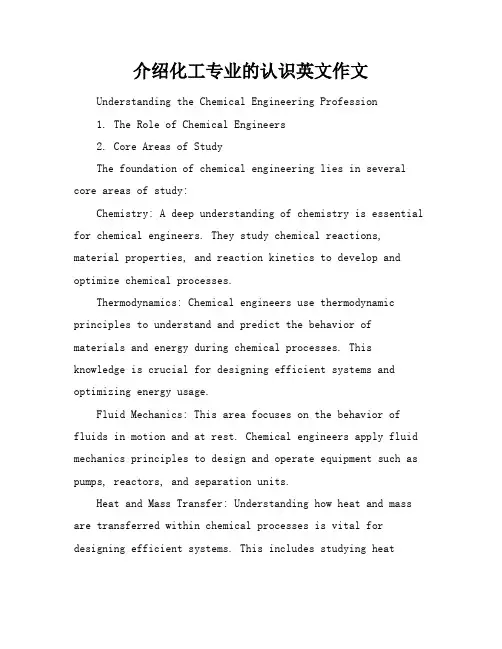
介绍化工专业的认识英文作文Understanding the Chemical Engineering Profession1. The Role of Chemical Engineers2. Core Areas of StudyThe foundation of chemical engineering lies in several core areas of study:Chemistry: A deep understanding of chemistry is essential for chemical engineers. They study chemical reactions, material properties, and reaction kinetics to develop and optimize chemical processes.Thermodynamics: Chemical engineers use thermodynamic principles to understand and predict the behavior of materials and energy during chemical processes. This knowledge is crucial for designing efficient systems and optimizing energy usage.Fluid Mechanics: This area focuses on the behavior of fluids in motion and at rest. Chemical engineers apply fluid mechanics principles to design and operate equipment such as pumps, reactors, and separation units.Heat and Mass Transfer: Understanding how heat and mass are transferred within chemical processes is vital for designing efficient systems. This includes studying heatexchangers, distillation columns, and other separation technologies.Process Control: Chemical engineers utilize processcontrol techniques to monitor and regulate chemical processes, ensuring they operate within desired parameters and maintain product quality.3. Practical ApplicationsChemical engineering is instrumental in numerouspractical applications that impact daily life and industry: Energy Production: In the energy sector, chemical engineers work on optimizing processes for extracting, refining, and utilizing energy sources, including fossil fuels, biofuels, and renewable energy.Environmental Protection: Chemical engineers contributeto environmental sustainability developing technologies for waste treatment, pollution control, and resource recovery. They work on projects aimed at reducing the environmental impact of industrial activities.Food and Beverage Industry: Chemical engineers design and optimize processes for food and beverage production, focusing on improving quality, safety, and efficiency in manufacturing.4. Challenges and InnovationsChemical engineering faces several challenges thatrequire innovative solutions:Sustainability: Chemical engineers are increasingly focused on developing sustainable processes and technologies that minimize environmental impact and promote the use of renewable resources.Safety: Ensuring safety in chemical processes is paramount. Chemical engineers must address potential hazards, implement safety protocols, and design systems that prevent accidents and protect workers and the environment.5. Future ProspectsConclusion。
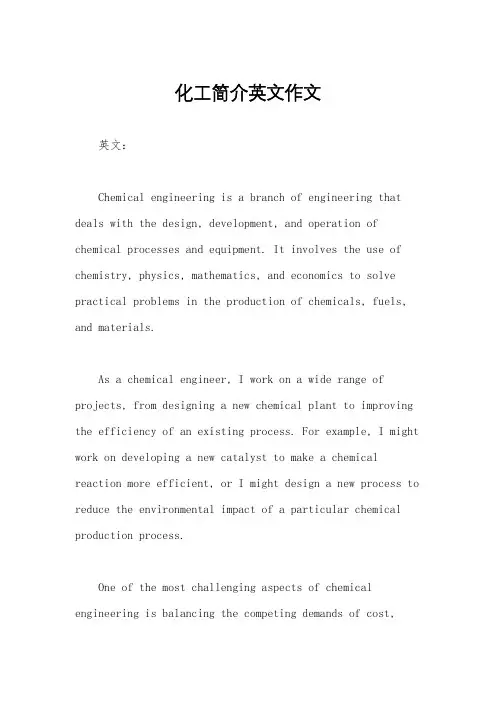
化工简介英文作文英文:Chemical engineering is a branch of engineering that deals with the design, development, and operation of chemical processes and equipment. It involves the use of chemistry, physics, mathematics, and economics to solve practical problems in the production of chemicals, fuels, and materials.As a chemical engineer, I work on a wide range of projects, from designing a new chemical plant to improving the efficiency of an existing process. For example, I might work on developing a new catalyst to make a chemical reaction more efficient, or I might design a new process to reduce the environmental impact of a particular chemical production process.One of the most challenging aspects of chemical engineering is balancing the competing demands of cost,efficiency, and environmental impact. For example, aprocess that is highly efficient may also be very expensive, while a process that is cheap may have a high environmental impact.Despite these challenges, I find chemical engineeringto be a rewarding and exciting field. I enjoy theopportunity to work on projects that have a real-world impact, and I am constantly learning new things andapplying my knowledge to solve complex problems.中文:化学工程是一门工程学科,涉及化学过程和设备的设计、开发和运营。
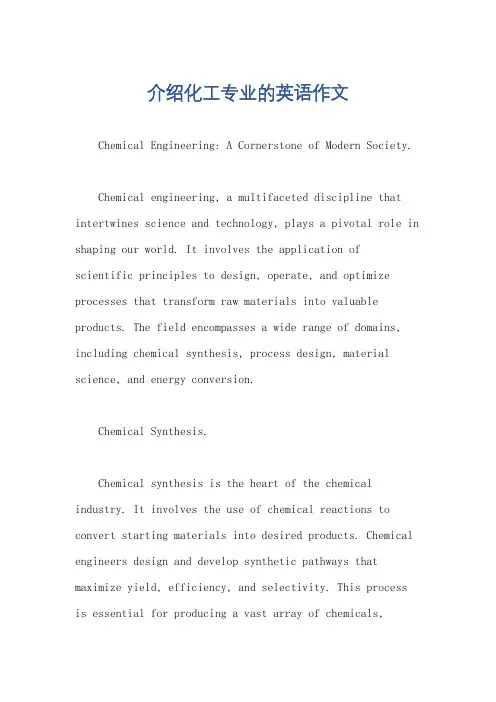
介绍化工专业的英语作文Chemical Engineering: A Cornerstone of Modern Society.Chemical engineering, a multifaceted discipline that intertwines science and technology, plays a pivotal role in shaping our world. It involves the application ofscientific principles to design, operate, and optimize processes that transform raw materials into valuable products. The field encompasses a wide range of domains, including chemical synthesis, process design, material science, and energy conversion.Chemical Synthesis.Chemical synthesis is the heart of the chemical industry. It involves the use of chemical reactions to convert starting materials into desired products. Chemical engineers design and develop synthetic pathways that maximize yield, efficiency, and selectivity. This process is essential for producing a vast array of chemicals,including pharmaceuticals, plastics, fertilizers, and fuels. Process Design.Chemical processes are complex operations that require careful design and optimization. Chemical engineers use mathematical modeling, simulation, and computational toolsto design and scale up chemical processes. They determinethe optimal operating conditions, equipment design, and process control strategies to ensure safety, efficiency,and environmental sustainability.Material Science.Materials science involves the study and development of new materials with tailored properties. Chemical engineers collaborate with materials scientists to design and synthesize materials that meet specific requirements for applications in various industries. These could include lightweight and strong materials for aerospace, corrosion-resistant coatings for chemical processing, orbiocompatible materials for medical devices.Energy Conversion.Energy conversion is another critical aspect of chemical engineering. Chemical engineers design and develop technologies for the efficient conversion of various energy sources, such as fossil fuels, biomass, and solar energy. This field plays a vital role in addressing global energy challenges, reducing greenhouse gas emissions, and promoting sustainable development.Education and Career Opportunities.Pursuing a degree in chemical engineering opens doors to a wide range of career opportunities. Chemical engineers find employment in various industries, including petrochemicals, pharmaceuticals, biotechnology, food processing, and environmental engineering. They work in roles such as process design, plant operation, research and development, and technical management.Chemical engineering programs typically require astrong foundation in mathematics, physics, and chemistry. Students also gain hands-on experience through laboratory courses and research projects. Many universities offer specialized programs in specific areas, such as bioprocess engineering, energy systems, or computational chemical engineering.Conclusion.Chemical engineering is an essential field that drives innovation and progress in modern society. It encompasses a diverse range of disciplines, from chemical synthesis to process design, material science, and energy conversion. Chemical engineers play a crucial role in developing and optimizing processes that produce valuable products, advance scientific research, and address global challenges. With its focus on sustainability, efficiency, and innovation, chemical engineering continues to be a cornerstone of modern society and a promising career path for those who seek to make a tangible impact on the world.。
化工类英语作文400词Title: The Evolving Landscape of Chemical EngineeringChemical engineering, a discipline that bridges the gap between the natural sciences and industrial applications, has undergone significant transformations in recent years. This field, which focuses on the design, optimization, and management of chemical processes, plays a pivotal role in various industries, including pharmaceuticals, petrochemicals, and environmental engineering.The advancement of technology has been a driving force in the evolution of chemical engineering. The integration of automation and artificial intelligence has led to increased efficiency and precision in chemical processes. For instance, the use of advanced sensors and control systems has enabled real-time monitoring and adjustment of process parameters, resulting in reduced waste and optimized resource utilization.Moreover, the focus on sustainability and environmental stewardship has also influenced the direction of chemical engineering. Engineers are now tasked with developing processes that are not only economically viable but also environmentally friendly. This shift has led to the exploration ofrenewable energy sources, the development of bio-based materials, and the implementation of circular economy principles in chemical manufacturing.The globalization of the chemical industry has also presented new challenges and opportunities for chemical engineers. The need to comply with varying regulatory standards and to adapt to diverse market demands has necessitated a more global perspective in engineering design and operations. At the same time, the increasing interconnectedness of the world has opened up new avenues for collaboration and knowledge sharing among engineers across the globe.The future of chemical engineering looks promising. With continued advancements in technology and a growing awareness of the need for sustainable practices, this field is poised to make significant contributions to society. Chemical engineers will continue to play a crucial role in developing innovative solutions to address the world's most pressing challenges, such as climate change, resource scarcity, and public health issues.In conclusion, chemical engineering is a dynamic and evolving discipline that is constantly adapting to newtechnologies, environmental considerations, and global trends. The challenges and opportunities that lie ahead are numerous, but with the dedication and ingenuity of chemical engineers, the future looks bright.。
什么是化工英文作文英文:Chemical engineering is a branch of engineering that deals with the design, development, and operation of chemical processes and equipment. It involves the use of chemistry, physics, mathematics, and economics to solve problems related to the production and use of chemicals, fuels, drugs, food, and other products. Chemical engineers work in a wide range of industries, including oil and gas, pharmaceuticals, food and beverage, plastics, and environmental engineering.As a chemical engineer, I have been involved in the development of new processes for producing chemicals and materials. For example, I worked on a project to develop a new method for synthesizing a polymer that is used in medical devices. This involved designing and building a new reactor system, optimizing reaction conditions, and testing the product to ensure that it met the requiredspecifications.Another aspect of chemical engineering is process optimization. This involves analyzing existing processes to identify inefficiencies and areas for improvement. For example, I worked on a project to optimize a production process for a specialty chemical. We were able to reducethe cycle time, increase yield, and improve product quality, which resulted in significant cost savings for the company.中文:化学工程是一种工程学科,涉及化学过程和设备的设计、开发和操作。
介绍化工专业的认识英文作文英文回答:Chemical engineering is a branch of engineering that applies physical sciences, life sciences, and mathematics to the design, construction, operation, and maintenance of chemical plants, as well as to the development of new chemical processes and products. Chemical engineers work in a wide variety of industries, including the petrochemical, pharmaceutical, food, and beverage industries.Chemical engineers are responsible for designing and operating chemical plants, which are used to manufacture a wide variety of products, including plastics, fertilizers, fuels, and pharmaceuticals. They also develop new chemical processes and products, and work to improve the efficiency and safety of existing processes.Chemical engineering is a challenging and rewarding field that offers a wide range of career opportunities.Chemical engineers are in high demand, and they can earn a good salary. If you are interested in a career in science and engineering, then chemical engineering may be the right field for you.中文回答:化工专业是工程学的一个分支,它应用物理科学、生命科学和数学来设计、建造、操作和维护化工厂,以及开发新的化工工艺和产品。
介绍化工专业的英语作文英文回答:Chemical engineering is a fascinating field that combines principles of chemistry, physics, and mathematics to design and operate processes that convert raw materials into valuable products. As a chemical engineering student, I have learned how to apply scientific knowledge to solve practical problems in various industries such as pharmaceuticals, energy, and environmental protection.One of the reasons I chose to study chemical engineering is because of the wide range of career opportunities available in this field. For example, chemical engineers can work in research and development, process design, production, quality control, and even sales and marketing. This versatility allows me to explore different areas and find a job that best suits my interests and skills.In addition, chemical engineering is a constantly evolving field, with new technologies and innovations being developed all the time. For instance, I recently learned about the use of nanotechnology in drug delivery systems, which has the potential to revolutionize the pharmaceutical industry. Being able to work on cutting-edge projects like this is both challenging and rewarding.Furthermore, studying chemical engineering has taught me valuable skills such as problem-solving, critical thinking, and teamwork. These skills are not only important in my academic studies but also in my future career. For example, during a group project to design a water treatment plant, I had to collaborate with my classmates to come up with creative solutions to complex problems. This experience not only improved my technical knowledge but also my communication and leadership skills.Overall, studying chemical engineering has been a rewarding experience that has prepared me for a successful career in a dynamic and fast-paced industry.中文回答:化工专业是一个迷人的领域,它结合了化学、物理和数学原理,设计和操作过程,将原材料转化为有价值的产品。